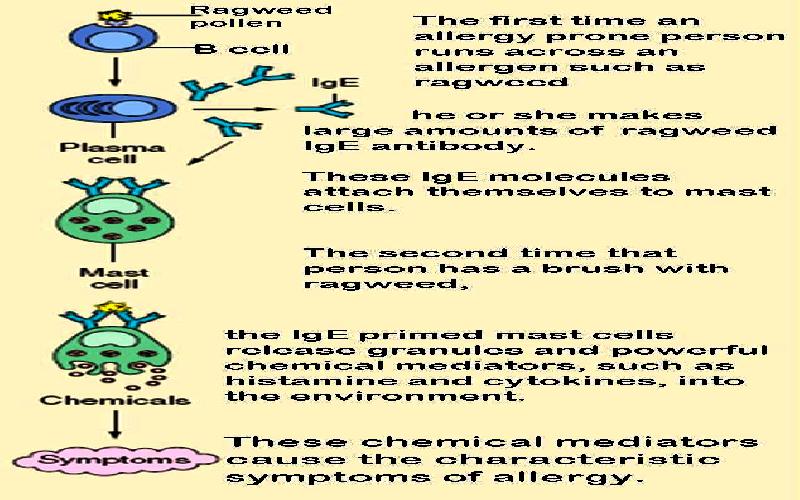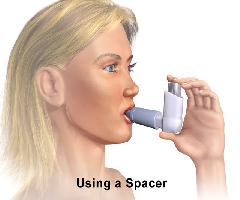Asthma is not necessarily due to allergies, but the two are generally linked, often closely enough to be present together. Both are conditions resulting from the hypersensitivity of the immune system to simple protein molecules that exist in abundance around us. ‘Allergic Asthma’ refers to cases where the link between the two is strong enough, and can be confirmed by diagnostic tests. Such Allergic Asthma accounts for 60% of all asthma cases. These chronic, often life-long conditions, need to be borne by the patient and lived through, as there is often no effective cure for them.
Allergies
Allergies are a kind
of hypersensitivity of our body to certain external substance that it comes in contact with. Normally, the immune system of the body is triggered to protect it foreign pathogens, like bacteria and viruses. However, in the presence of allergies, the immune reaction gets triggered by relatively innocuous particles that do not pose any significant threat. One can be allergic to any substance, but most of the times, it is either some sort of protein- as part of dust within the house or pollen in the garden or the wild, or some chemical that is part of some detergent, cleaning agent or polish. Allergies lead to excessive production of antibodies, mast cells and release of certain chemicals like histamine that cause swelling and inflammation. The body parts that get exposed to these allergens, like skin, eyes nose and airways are the ones affected frequently, and cause symptoms such as running nose, itchy eyes, sneezing, scratchy throat, rashes and hives.Asthma
Asthma consists of an abnormal contraction of our respiratory airways, which may be a result of an abnormal control mechanism or allergy. Beginning from the nose and mouth, our wind-pipe, also called "trachea", gets divided into two branches, called "bronchi", each one of which get divided into a network of smaller "bronchioles" which end in the lung. In asthma, there is contraction of these smaller airways or bronchioles that result in the feeling of suffocation, and cough. In addition, very often there is excessive secretion of mucus in the airways, inflammation of their walls and in more severe cases.
Link between the two: Allergic Asthma
While allergies and asthma are not exactly the same, and need not always be present together, the link between allergies and asthma is quite common, with a lot of asthmatics having clearly detectible signs of allergy. When this link is strong and very clearly observed, it is referred to as ‘Allergic Asthma’, or ‘Allergy induced Asthma’. As the name explains, these are cases where allergic reaction in the airways leads to features of asthma. In fact, it is more common type of Asthma, with nearly 60% asthmatics being affected by it in the United States. It is even common in asthmatic children, with close to 90% children with asthma showing clearly visible signed of
allergies.The link between asthma and allergies is also observed in the family history of patients having these conditions. The presence of allergies in parents also increases the probability of asthma in the children.
Factors that lead to Asthma
Asthma is not one single disease resulting from one single cause, as happens in case of Influenza or Malaria. It can result from many different factors that cause hypersensitivity of these airways or bronchioles. These airways are lined by a layer of mucosa which normally secrets a thin layer of mucus to keep the airways clean and trap any small particles. In case of Asthma, the hypersensitivity of this mucosa leads to excess secretion of mucus, which along with the contracting airways leads to narrowing of airways and suffocation.
One of the reasons for hypersensitivity of airways or bronchioles and its mucosa is the allergy to some outside material, like dust or pollen. So when a person is exposed to a substance to which he is allergic, there is cough and suffocation that result in an asthmatic attack. Often such persons are allergic to many substances and can develop asthmatic attacks frequently in response to many different substances. Sometimes, the original cause of asthma is something else, but the allergic reaction of the body to some substance suddenly worsens the situation and leads to asthmatic attack.
Allergens, that are often associated with precipitation of asthma include pollen from trees, grasses, and weeds, mold, spores, animal dander from hair, skin, or feathers, dust, mite etc. Other irritants that can also worsen asthma include smoke, air pollution, cold air, exercise (especially in cold air), and strong odors or fumes.
Precautions for Asthmatics & Treatment
Those with asthma need to be careful when it comes to dust and gardens. It may sometimes be helpful if one is able to find the cause of allergy that precipitates asthma. In any case, asthmatic patients should always keep their medicines handy, and always remember their physician's instructions in this regard. There are several effective medicines for treating allergic and non-allergic asthma, but these require a prescription, and should always be taken with medical advice. These include inhaled steroids, which fight inflammation, and bronchodilators, which help in enlarging the airways to relieve suffocation. An alternative medication could be injectable medicines that reduces IgE levels.
Asthma is something that is difficult to cure. However, with adequate precautions, it should be possible to lead a reasonably normal life in spite of it.
Allergic Asthma, a condition where in both allergies and asthma co-exist in a patient, is a very common and dominant form of asthma, particularly in children with asthma.










